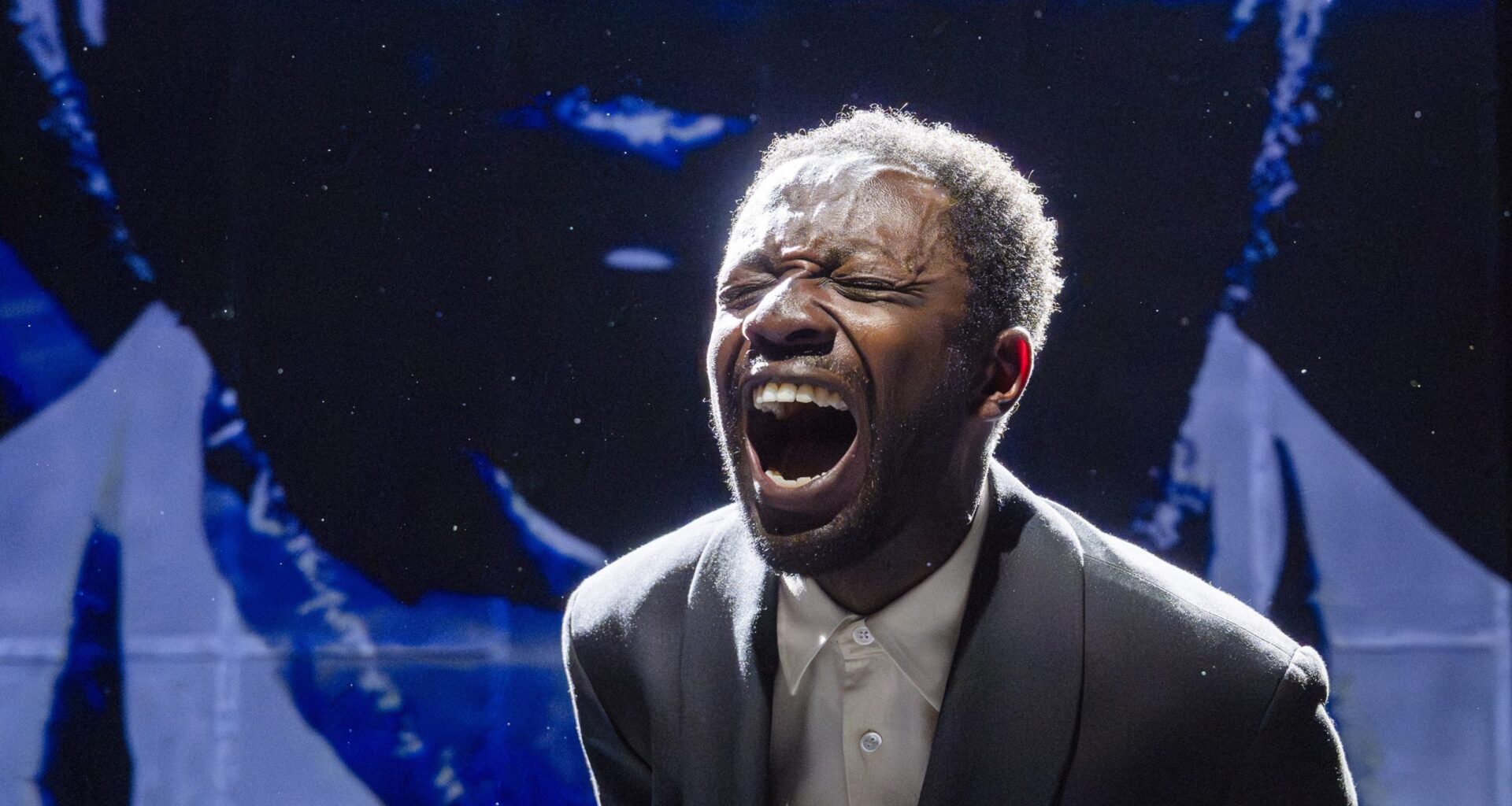In Essex Hemphill’s poem ‘American Wedding’, published in 1992, he writes that ‘Every time we kiss / we confirm the new world coming’. Here, intimacy itself becomes defiance: to live black, gay love is to live love out loud, against the dominant voices of society.
Harrison Davis Rivers’ play This Bitter Earth at the Soho Theatre (directed by Billy Porter) quickly emerges as in conversation with the late poet Hemphill. It is Hemphill’s words that Neil (played by Alexander Lincoln), a white anti-racism activist, recites when a megaphone is thrust into his hands at a Black Lives Matter protest. The same words that have been memorised and lived by Jesse (played by Omari Douglas), a black playwright, who finds himself joining in with Neil, as he wonders why on earth the white man is speaking. It is Hemphill who happens to have been the subject of Jesse’s university dissertation. And so, it is Hemphill whose words encircle and demarcate the boundaries of Jesse and Neil’s relationship. The quote above renders their acts towards each other simultaneously acts that demand a ‘new world’.
There is no sudden indication of the play’s opening. No voice-over reminds us of the typical rules of performance. Jesse wanders down the stairs and asks us whether we are shocked to see him. And we are. Rivers’ play immediately breaks the fourth wall as Jesse speaks directly to us, and perhaps this reinforces the idea that their relationship is always in dialogue with us and the wider discriminatory society that we represent.
What makes Rivers’ play brilliant is that he breaks down so-called black apathy […] It isn’t that Jesse is ‘doing nothing’ but rather that every action he does, from breathing to writing to loving is a political act.
Set between 2012 and 2015, moving from Obama’s second presidential term to the beginning of Trump’s presidential campaign, Jesse and Neil’s relationship unfolds against a political backdrop that only becomes more present when we cross the threshold of their front door. The first conflict in the play is due to Neil’s desire to travel down South to aid victims of police brutality and Jesse’s belief that this is his attempt to deal with his white privilege. Later, we learn that they met in the throng of a BLM protest. The face of Trayvon Martin emerges in the gaps of the artwork behind the couple’s bed due to Curran’s lighting. The betrayal of Neil’s infidelity is cast aside when Jesse hears about the 2015 Charleston Church shooting. This is the scene where we finally see Jesse’s rage: his language is clipped, short, broken. He can’t comprehend the event, the fact that the ‘Motherfucker killed nine people last night’. He ‘can’t get over that’.
What makes Rivers’ play brilliant is that he breaks down so-called black apathy. This rageful vignette resists a reduction of Jesse to someone who doesn’t care about the BLM movement: a predication that everyone, even his own boyfriend, seems intent on making. It isn’t that Jesse doesn’t care, it is that Jesse is tired. It isn’t that Jesse is ‘doing nothing’ but rather that every action he does, from breathing to writing to loving is a political act. As he screams at Neil towards the end of the play, ‘I’m living my fucking life! What else do you want from me?’ We don’t empathise here, because we can’t, but we step closer to understanding the burden of being constantly asked to fight openly, visibly, tangibly against an oppression imposed upon you.
Hemphill’s words once again ring true. He writes in ‘Cordon Negro’, a poem whose title itself illustrates the inability to sunder blackness from societal constraint, that ‘After I swallow my liquid valium, / my private celebration / for being alive this morning, / I leave my shelter’. Rivers shows that living, an action which demands moving from ‘shelter’ to what can only be its opposite, danger, is an act of protest in itself. Apathy for Jesse cannot exist because blackness does. No wonder, then, that in the play he is writing, his protagonist is ‘dying of Blackness’; no wonder, then, that in his dream he envisions a world of ‘blackness’, where Maya Angelou, Ralph Ellison, Zora Neale Hurston and more mill about; no wonder, then, that he dreams of a life where his ‘shelter’ resembles the world itself, not a mere minority abstraction.
Leitmotifs reinforce the play’s exploration of the intersectionality of blackness of gayness of America. The American state song that Jesse and Neil drunkenly sing when they dance in the street after a night at a bar, repeated an hour later with both actors sombrely facing the audience, feels more like a listing of every site of police brutality. A reminder of its omnipresence. The silk sheet standing in as the bed on stage for the audience, reappears in Jesse’s hands scenes later, in a linking scene where he dances alone on stage. Here, the sheet flowing and caught in the lighting is a boundary between Jesse and the world, which allows for his liberated movement. The repeated sound effects of the broken glass are a countdown to the play’s ending, where Neil’s death, after a glass is thrown at him by a passerby, is revealed.
Neil’s death confirms that the outside world is no ‘shelter’ for the individuals that Jesse and Neil are. So when Jesse says during his speech at the funeral to ‘Take care of your blessings’, words repeated from the play’s opening and in neon lettering above its stage, he is telling the oppressed individual, allowing them, to take the time to recognise who or what those ‘blessings’ are. He invites them to establish a boundary between their true self and their oppressed self: he is defending their right to exhaustion, to apathy, to some search for internal peace.
Post Views: 237
Liked this article? Why not share it?
Related
